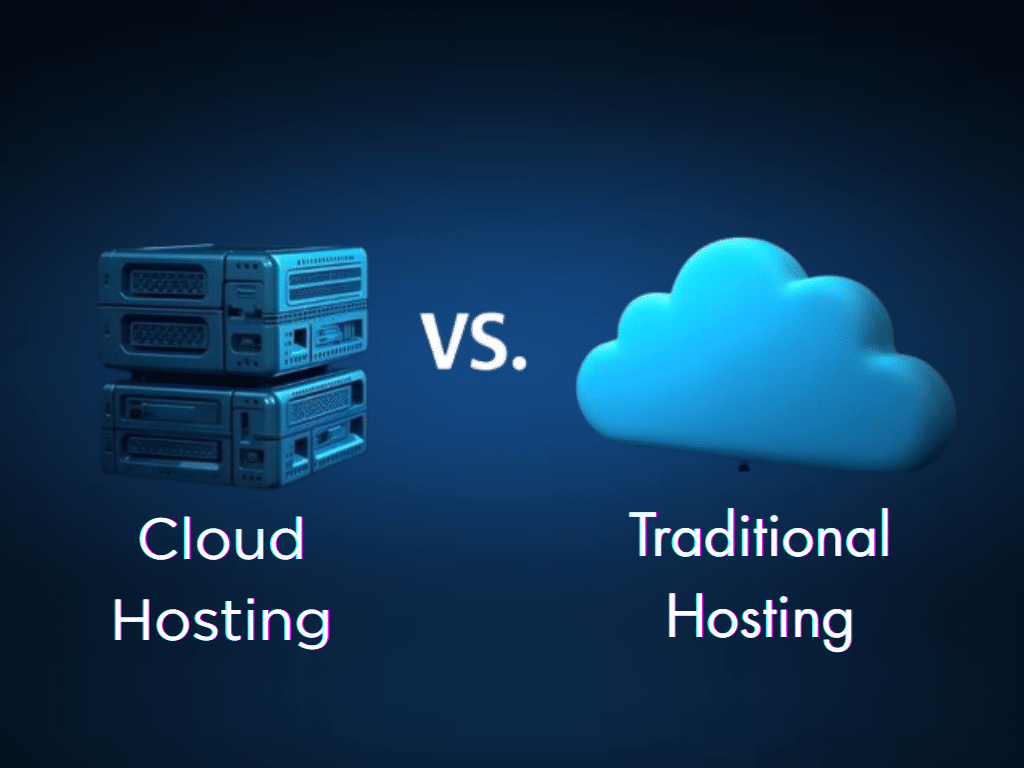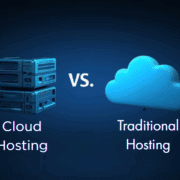Cloud Hosting vs. Traditional Hosting: Which is Better for Website Development Services?
Every business needs a website to ensure growth in today’s digital landscape, and every website needs reliable hosting to exist online. But with so many options available, most businesses get stuck choosing the right option.
Out of all, two of the most popular ones are cloud hosting and traditional hosting.
Whether you’re creating a new website for your startup, revamping the existing one, or scaling your online store, the foundation lies in selecting the right hosting solution. While traditional hosting has always been the first choice for website development services, cloud hosting has evolved as a more flexible and scalable solution.
Due to their unique pros and cons, the debate between cloud hosting vs. traditional hosting has left several businesses confused or leading them to the wrong decision.
With this blog, we will end the debate once and for all. By breaking down cloud hosting and traditional hosting with their unique advantages and disadvantages, we will help you determine which one is best for website development services.
What is Cloud Hosting?
Cloud hosting is a modern and innovative hosting solution that leverages a network of interconnected virtual servers to distribute website data across multiple locations. Unlike traditional hosting, which depends on a single physical server, cloud hosting offers scalability, redundancy, and high availability.
A cloud hosting infrastructure ensures that even if one server fails, your website remains online and functional, making cloud hosting an appealing choice for a website development company that aims to develop a website with uninterrupted performance and seamless user experience.
Advantages of Cloud Hosting
Since cloud hosting is a more advanced and sophisticated hosting solution, it offers a ton of advantages to businesses and their websites;
Scalability: Cloud hosting allows you to scale resources up or down based on real-time needs. This flexibility is ideal for businesses experiencing fluctuating traffic or planning to scale their online presence.
Cost Efficiency: Cloud hosting often follows a pay-as-you-go model, allowing website designing services to optimize costs. You only have to pay for the cloud resources you use, avoiding overspending on unused capacity.
Improved Security: Cloud platforms typically come with advanced security protocols, including automated updates, firewalls, and DDoS protection. This is essential for a website handling sensitive client data or information.
Disadvantages of Cloud Hosting
Although the advantages of cloud hosting make it an intimidating option, it also comes with some disadvantages that businesses must consider;
Complexity: For small businesses or non-technical teams, managing cloud hosting without a professional web development company can be complicated. It often requires a steep learning curve or hiring technical experts.
Dependence on Internet Connectivity: Since everything is cloud-based, poor internet connectivity can hinder access to your hosting dashboard or website management tools, which leads to a poor user experience.
Data Privacy Concerns: Cloud hosting involves sharing and storing sensitive data on cloud platforms, which may raise privacy and compliance issues, particularly for businesses in regulated industries like finance and healthcare.
What is Traditional Hosting?
Traditional hosting refers to hosting solutions like Shared Hosting, VPS (Virtual Private Server), and Dedicated Hosting that rely on a single physical server located in a data center. This is a long-established method of hosting websites and remains popular among small businesses, startups, and website development services.
Most traditional hosting solutions can host multiple websites, sharing resources between parties (common in shared hosting). Traditional hosting providers handle all the maintenance, updates, and security for the server hardware, making it an ideal hosting option for those without extensive IT knowledge.
Advantages of Traditional Hosting
Website designing services prefer traditional hosting due to the several advantages it offers for their websites over other hosting solutions;
Simplicity and Ease of Use: Traditional hosting is generally easier to set up and manage, as service providers manage most of the fundamental aspects. This is especially beneficial for startups or small businesses.
Predictable Pricing: With fixed monthly or annual plans, it becomes easier for a business working with a website development company to manage hosting costs without worrying about sudden price hikes.
Resource Control: With VPS and dedicated hosting solutions, you get better control over your server environment. This allows for extensive customization based on your specific performance or functionality needs.
Disadvantages of Traditional Hosting
Similar to cloud hosting, traditional hosting also comes with some disadvantages that may affect your choice between the two;
Limited Scalability: Scaling resources with traditional hosting requires manual upgrades or migration to a higher-tier plan. This limitation can restrict growth for companies working without website development services.
Single Point of Failure: Since all your data resides on a single server with traditional hosting, hardware failure or server issues can lead to downtime or data loss for your website, which could hinder business operations.
Security Risks: Shared environments in traditional hosting are generally more vulnerable to security breaches, which may not be ideal for businesses handling projects with sensitive data and confidential information.
Which is Better for Website Development Services?
When it comes to choosing between traditional hosting and cloud hosting for website development services, the decision is not that easy to make, especially if you are new to web development and infrastructure. To make things easy, you can compare the two solutions based on some key aspects that matter to every business.
Here are five key points that can help you decide which one out of cloud hosting or traditional hosting is better for you:
Performance and Reliability
Cloud hosting generally outperforms traditional web hosting in terms of speed and uptime as it uses multiple servers. Traditional hosting can suffer from performance issues if other sites on the same server experience high traffic.
Cost
Traditional web hosting is typically more affordable, with fixed pricing plans that make budgeting easier. Cloud hosting costs higher and its pricing varies based on usage, which makes it a less attractive option for small businesses.
Scalability and Flexibility
Cloud hosting is the clear winner when it comes to scalability and flexibility. It allows you to easily scale your website based on demand, making it ideal for businesses aiming for rapid growth. Traditional hosting is more rigid.
Usability and Implementation
When compared to cloud hosting, traditional hosting stands as an easy-to-use option for businesses that have limited IT knowledge and lack a dedicated team. Traditional hosting can be implemented easily with the help of service providers.
Security
Both traditional hosting and cloud hosting offer robust security features. Still, cloud hosting often provides more advanced options. With cloud hosting, you can implement additional security measures like firewalls and DDoS protection.
The Final Verdict
Both cloud hosting and traditional hosting have their unique pros and cons. However, choosing between cloud and traditional hosting depends largely on the specific needs of your business or that of your target audience. You must consider factors that largely affect your business and how you achieve your business goals.
Cloud hosting is a superior choice if you are looking for high flexibility and scalability. On the other hand, traditional hosting will serve you better if you require better resource control and more cost-efficiency. If you are still confused between the two, a professional web development company can help you make the right choice.




